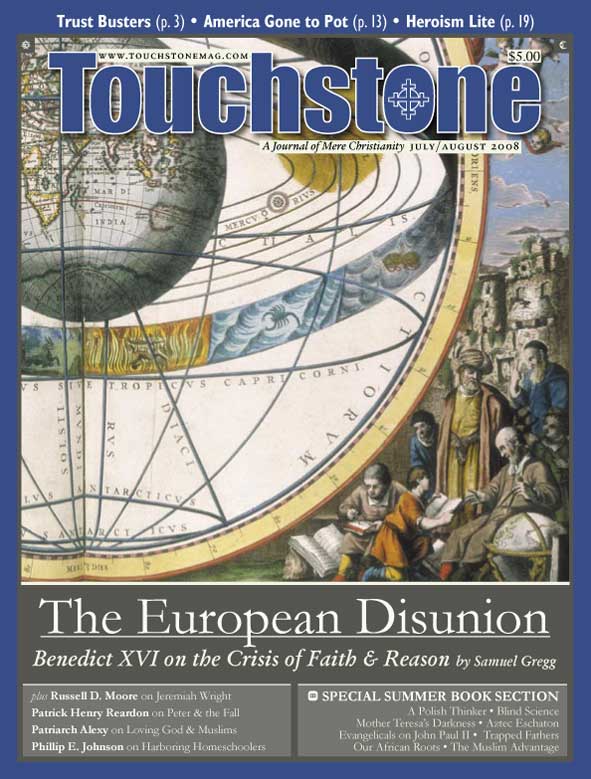Book Review
The Father Trap
Taken into Custody: The War Against Fatherhood, Marriage, and the Family
by Stephen Baskerville
Cumberland House Publishing, 2007
(352 pages, $24.95, paperback)
reviewed by Anne Hendershott
Some readers may greet Stephen Baskerville’s Taken into Custody with skepticism. The hyperbolic subtitle and the opening page’s warning that “divorce today means the invasion and destruction of private life by the state” promise a polemical treatment of a serious social problem.
But Baskerville, a graduate of the London School of Economics and author of a significant number of thoughtful and well-researched scholarly articles on fatherhood and family issues, offers a compelling study of what he concludes is “one of the greatest and most destructive civil rights abuse issues in America”: the government-run family court system that oversees custody arrangements and financial support for the children of divorcing parents.
A professor of government at Patrick Henry College, he combines sociological data with anecdotal case studies to support his allegations.
Deadbeat Dad Hoax
Rejecting the conventional wisdom on the abandonment of children by their fathers advanced by politicians, civil servants, journalists, and books like David Popenoe’s Life Without Father and David Blankenhorn’s Fatherless America, Baskerville dismisses the image of the “deadbeat dad” as a “hoax . . . perpetrated by government officials and lawyers who plunder parents whose children they have taken away.”
He criticizes writers like Leon Kass, whose The End of Courtship faults feminism for contributing to “male liberation from domestication, from civility, and from responsible self-command,” and blames Kass for “stereotyping this nameless male with every cliché in the book.” Baskerville believes that “the harsh words of conservative commentators describing men as irresponsible creatures, utterly uncivilized by marriage, are used in courtrooms throughout America to incarcerate citizens without trial.”
Refusing to blame fathers for their absence from their children’s lives, Baskerville points to the role of the state in “allowing, encouraging and even forcing them to do so.” In a chapter entitled “Batterers or Protectors?” he argues that the court has the power to “seize control of a family” and remove all decision-making rights from a father based only on spousal accusations of child physical or sexual abuse.
It does this, he argues, even when these accusations are without merit. He produces data indicating that between 1 and 1.5 of every 1,000 child-abuse investigations ends up being a substantiated case of sexual abuse by the natural father, and that boyfriends and stepfathers are much more likely to perpetrate child sexual abuse than natural fathers.
“Father-caretakers” are four times more likely than biological fathers to sexually abuse the children in their care, according to a University of Iowa study he cites. According to the National Society for the Prevention of Cruelty to Children, father-daughter incest occurs among fewer than 4 in 1,000 children.
A Profitable War
For Baskerville, “family law represents the most intrusive perversion of government power in our time.” Citing the “vast expansion of federal police power” over fathers ushered in by the Clinton administration’s 1998 Deadbeat Parents Punishment Act and continued by the Bush administration in activities like the 2002 nationwide sweep of “deadbeat dads” under Project Save Our Children, he argues that the war against fathers emerged from self-serving government officials and a profit-seeking corporate bureaucracy, not the perceived need from families.
A divorced father himself, Baskerville argues that the image of the deadbeat dad was drawn by those who stood to gain financially, and he identifies by name those he calls “corporate bounty hunters”—most prominently, collection agencies allied with the government.
Robert Williams, for example, went from helping to establish guidelines in the federal Child Support Guidelines Project to founding his own consulting and collection agency. His revenues rose from $9.7 million in 1994 to $21 million in 1996 because of the Clinton administration crackdown on deadbeat dads.
From the stories he tells, one cannot escape the conclusion that, contrary to Max Weber’s model of bureaucratic rationality, many of the nation’s family-law bureaucrats act with the zeal of crusaders. One man, for example, was arrested the night after his release from five harrowing months as an Iraqi hostage, for not paying $1,425 in child-support payments while he was held hostage, while the state presented another man with a bill for nearly $50,000 for child support that he failed to pay while wrongfully imprisoned for ten years.
It is difficult to argue with the compelling case Baskerville makes that fathers are often the victims of an overgrown, self-serving bureaucracy. Yet, at the same time he accuses others of stereotyping “deadbeat dads,” he engages in some stereotyping himself by his refusal to acknowledge the recalcitrant fathers who really are unwilling to support their children.
A Useful Book
Despite this failure, Taken into Custody is a useful book for those concerned about the family law system, not only for Baskerville’s analysis of a neglected problem but also for his prescriptions for treatment. Baskerville suggests public policy reforms on divorce—reasonable limits on no-fault divorce when children are involved and shared parenting for children of divorce, for example—because they will begin to address the root of the problem.
In this book he provides ways to restore and enforce the traditional rights of fathers to the care, custody, and companionship of their children. •
Anne Hendershott is Professor of Urban Affairs at the King's College in New York City (www.tkc.edu). She is the author of Status Envy: The Politics of Catholic Higher Education (Transaction, 2008). She and her husband have two grown children and are members of St. Mary's Church in Milford, Connecticut.
subscription options
Order
Print/Online Subscription

Get six issues (one year) of Touchstone PLUS full online access including pdf downloads for only $39.95. That's only $3.34 per month!
Order
Online Only
Subscription

Get a one-year full-access subscription to the Touchstone online archives for only $19.95. That's only $1.66 per month!
bulk subscriptions
Order Touchstone subscriptions in bulk and save $10 per sub! Each subscription includes 6 issues of Touchstone plus full online access to touchstonemag.com—including archives, videos, and pdf downloads of recent issues for only $29.95 each! Great for churches or study groups.
Transactions will be processed on a secure server.
more on fatherhood from the online archives
more from the online archives
calling all readers
Please Donate
"There are magazines worth reading but few worth saving . . . Touchstone is just such a magazine."
—Alice von Hildebrand
"Here we do not concede one square millimeter of territory to falsehood, folly, contemporary sentimentality, or fashion. We speak the truth, and let God be our judge. . . . Touchstone is the one committedly Christian conservative journal."
—Anthony Esolen, Touchstone senior editor












